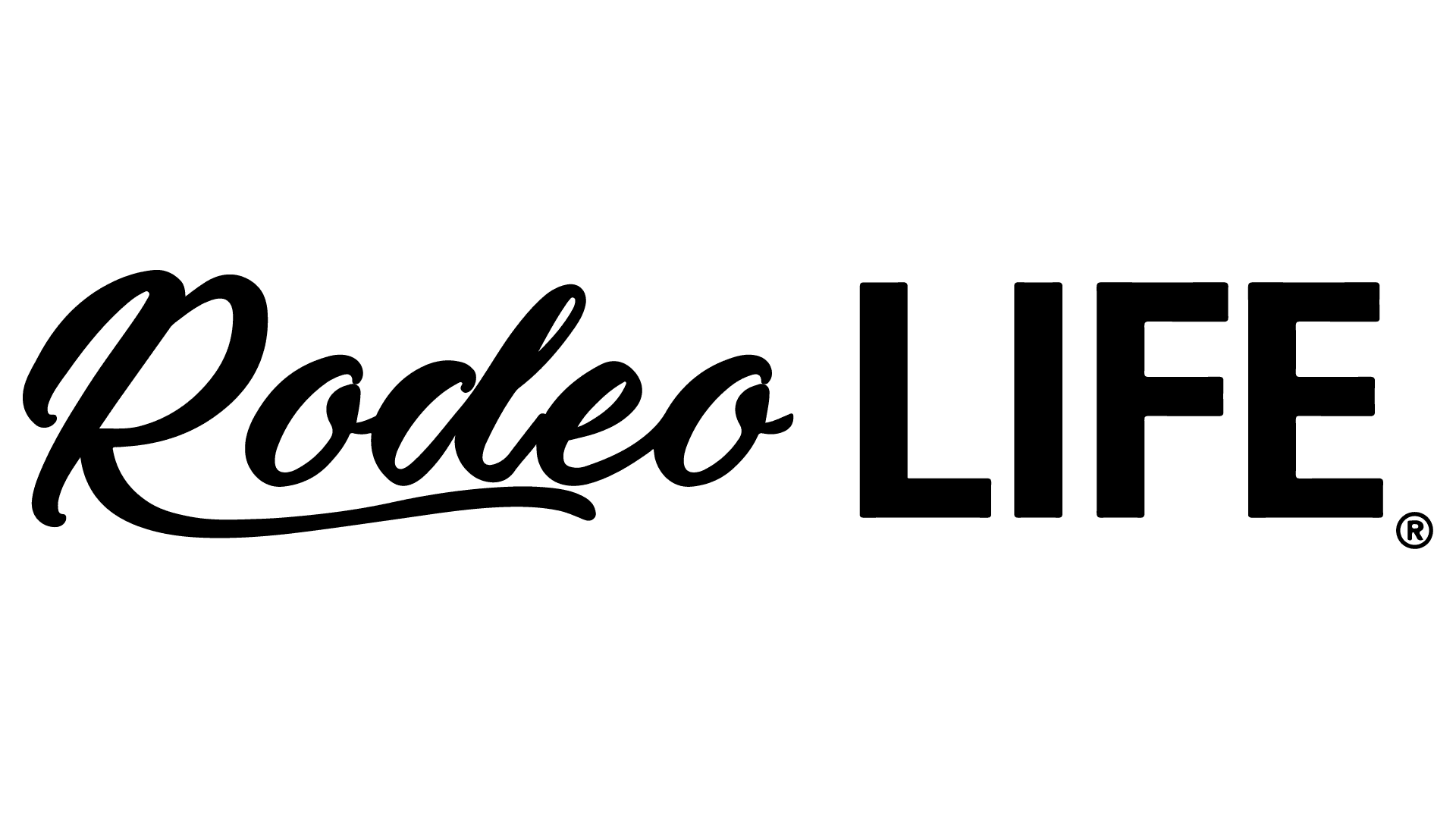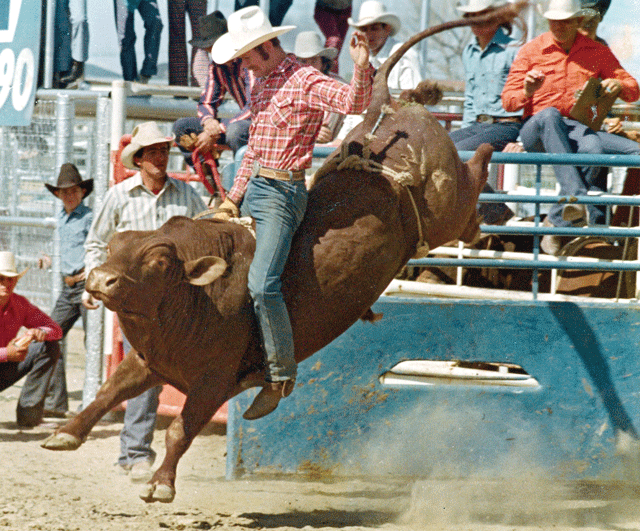Terry Peek craved riding bulls. And although he never made a living at it, it was his hobby, his lifestyle, and where he made many friends. The Bandera, Texas cowboy was born in 1945 in Paris, Texas, the son of Joe Bailey and Robbie Lee Peek. When he was seventeen years old, he was at a rodeo, behind the chutes, when someone asked him, “Son, do you want to get on this bull?” He thought it was a good idea, so he said, “You bet.” The man asked, “Did you sign a release form?” “I said, sure I did,” he recalls. “I didn’t even know what a release form was.”
So he found a cotton rope, wrapped it around the bull’s girth, and got on. He rode him for six seconds, got bucked off, and “from then on, I said, boy, this is fun and this is what I want to do.” The next Monday, he bought a bull rope and a pair of spurs, and his rodeo career began.
Terry, who had worked for local farmers and ranchers around Paris, had broken and ridden horses for people, earning $35 a head. After his first bull ride, he went to every junior rodeo he could get to, hitching rides with buddies or going on his own. He was friends with Sammy Andrews, Gerald Smith, who owned Wing Rodeo, and Robert Wright. Friends would meet at Robert’s, near Talco, Texas, every Sunday, to ride bulls.
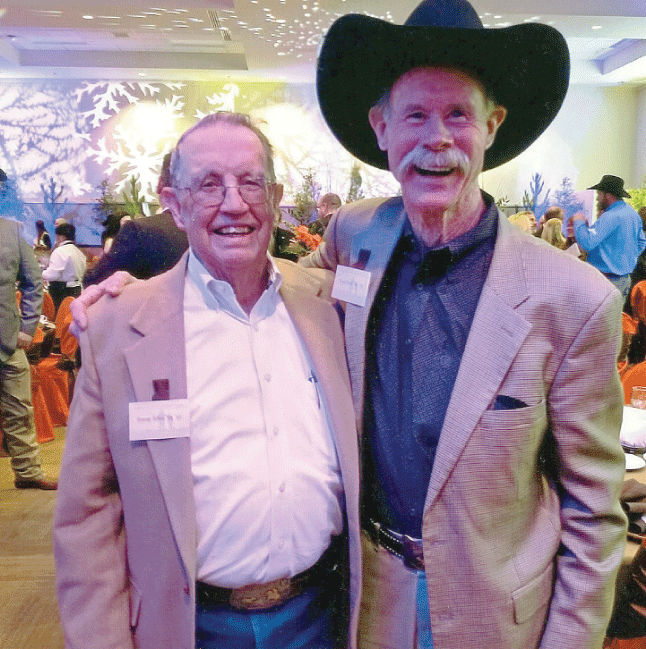
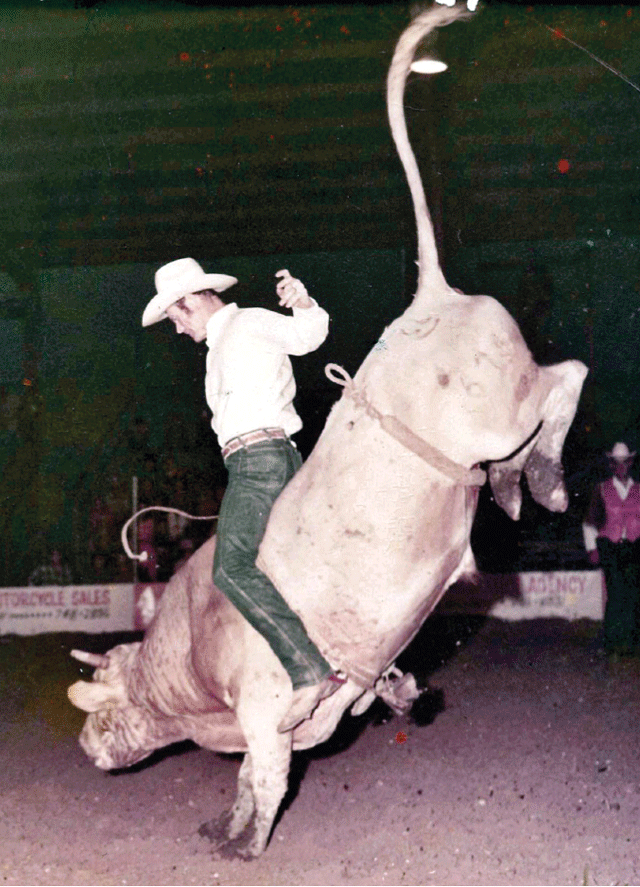
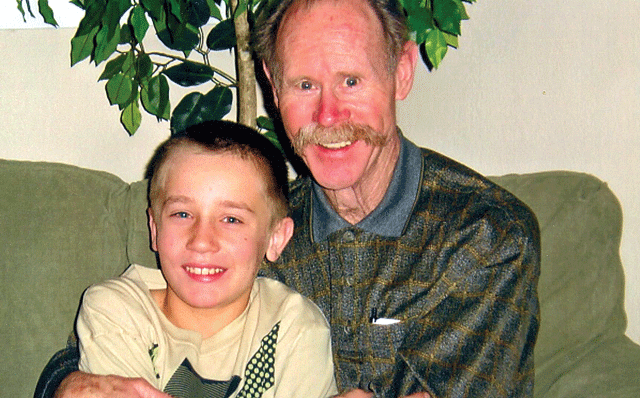
He was also friends with Todd Whatley, who introduced him to world champion bull rider Freckles Brown. Freckles’ home in Soper, Okla., was just across the state line from Paris, and Terry went to work for Freckles, putting up hay on his ranch. Terry rode bulls at the Paris rodeo, where Freckles was the judge, and when Terry won a go-round, Freckles was “tickled to death,” he said. “He said, Terry, did you get your check? I said, I don’t even know where to go.” Freckles laughed and said, “Son, go right up those stairs to the announcer’s stand and there will be a secretary there with a check.” It was a check for $250, “which was huge for me. I came back, showed it to Freckles, and he said, ‘that-a-boy.’”
His parents were not pleased with his decision to ride bulls. His junior year in high school, he declared to his parents that football did not interest him anymore; he’d be rodeoing. His mother had something to say about that. “She said,” Terry remembers, “let me explain something to you. You’ve made a commitment to play football to the coach. You’re going to fulfill that commitment. You can ride bulls, but you’ll play football.” He did, but “I was thrilled when the season was over,” he said.
His parents grew to accept his choice to rodeo. “They finally understood, this boy is going to do what he’s going to do. My mother said to my dad, let’s just go to some of his rodeos and watch him, so they did.”
After high school graduation, Terry was a student at Paris Junior College. He was still rodeoing, and to him, rodeo was more important than school. He declared to his mother that he was going to quit school and rodeo full time. “My mother had this look on her face,” he recalled. “She didn’t say anything.” A few weeks later, his mother told him Sonny Sikes, the rodeo coach at Sam Houston State University, had called, asking him to rodeo for the team. “I said, ‘he does?’” And she said, yes. “They have a great team there and he’s heard about you and he wants you to come and rodeo at Sam Houston.” It was a set-up; Sonny Sikes had never heard of Terry but his mother arranged it so that Terry would go back to college.
It worked. Terry attended Sam Houston State for two years, riding bulls for them and earning a degree.
While in college, he qualified for the College National Finals Rodeo in 1967 and 1968, finishing the ’67 season as Southern Region bull riding champion. Terry was in good company, competing alongside the likes of Phil Lyne, Carl Deeton, Ronnie Williams, and other good cowboys.
His parents made a real sacrifice to send him to college. Before he left for Huntsville, his mom and dad gave him fifty dollars. It was what they were able to save for him. His mother told him, “your dad and I have saved fifty dollars and we want you to have it, to get off to a good start.” Each week, his mom would put a case of Campbell’s soup on the bus to him. Terry would meet the bus at Huntsville to pick it up. “I always had food,” he said, even if he did get tired of soup. Sometimes he’d trade a buddy a can of soup for a hamburger. In 1968, he graduated from college with a degree in ag education. He enrolled in the master’s program at Sam Houston, but got drafted into the Marine Corps. He spent two years in the Marine Corps, stationed in various places on the west coast and in the Pacific, before his honorable discharge.
When he got out of the Marines, he got a job in Coldspring, Texas, teaching agriculture. He was still competing at 35 or 40 rodeos a year, all over east Texas, Louisiana, and farther. They were regional and International Pro Rodeo Association events.
After two years in Coldspring, he moved to Cortez, Colo., spending five years there as an ag teacher and the high school rodeo coach. He was still rodeoing, this time in Colorado, Utah and that part of the country.
In 1979, Terry moved to Ft. Collins, to work on his doctorate in ag science at Colorado State University. After earning his advanced degree, he moved to Glenwood Springs, Colo., to work for Colorado Mountain College as dean of community education. He had worked with Exxon Mobil, getting students jobs with the oil company. When Exxon offered him a job, he took it. They sent him to Colombia, South America for three years, then Mexico, then back to the States: Houston, Illinois and California.

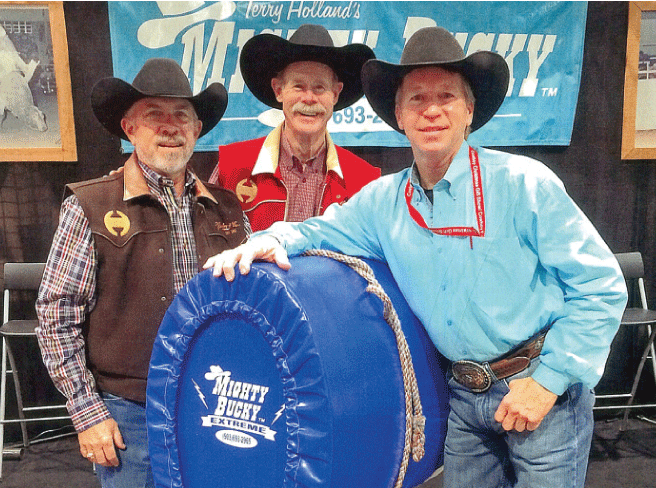
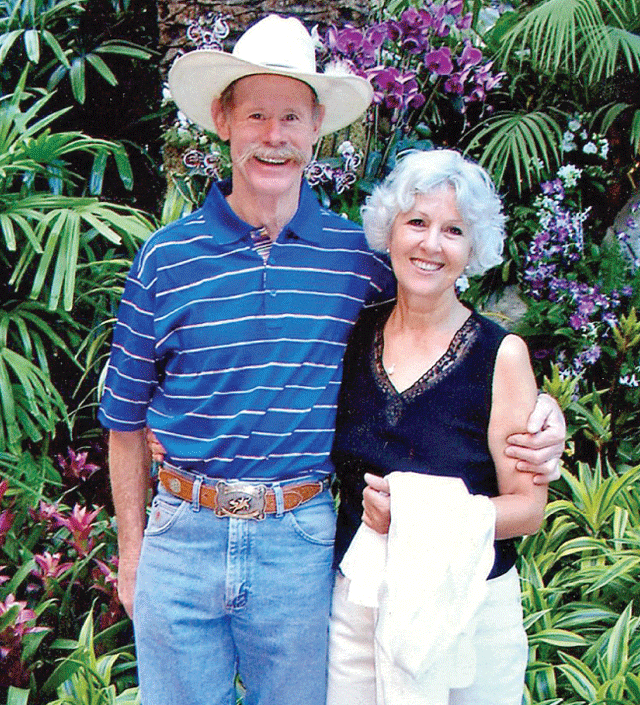
But he decided he missed teaching, so he went back to the classroom, as ag mechanics instructor and rodeo coach at Texas A&I in Kingsville (now Texas A&M in Kingsville). He loved the classroom and helping rodeo athletes. For the five years he was in Kingsville, his athletes qualified for the College National Finals every year.
It was there that he got on his last bull. Terry had quit riding at age 35, but at the age of 49, he got on one more. During an evening practice, the college bull riders couldn’t stay on. “They couldn’t ride a milk cow that night,” Terry remembered. “I said, ‘golly, you boys are pathetic. Let me show you how this works.” He got on a bull, rode for eight seconds, and when he dismounted, he fell and the bull stepped on him, breaking his pelvis and separating it three and a half inches. The college kids were laughing. “Yeah, yeah, Dr. Peek,” they said, as the ambulance came. “I was always one to take a dare,” Terry said.
After five years in Kingsville, the wanderlust in Terry returned, and he moved to Farmington, New Mexico, where he worked at San Juan College for five years. Then it was on to Roseburg, Oregon, to Umpquah Community College as vice-president. Two years later, he was on to Wenatchee (Wash.) Valley College.
He and his first wife had two sons: Josh Peek and Jason Peek (Terry and his sons are no relation to the steer wrestler Josh Peek from Colorado), and one of his grandsons, Idan Peek, needed some extra attention, so Terry raised him. After his divorce, he was single for many years. “That was good,” he said. “I wasn’t distracted. I was able to do my work and do a good job of raising that child.”
Then a chance encounter on a plane brought him his wife, Dorene. It was on a flight from Austin to Portland, and he was seated next to her. As they visited, he discovered that she was a barrel racer and her father had raised some National Finals Rodeo bucking bulls. After the plane ride, they stayed in touch, then married in 2008.
Terry retired in 2009 and the couple settled in Bandera, Texas. He still receives phone calls from former college kids who were inspired and helped by him. He was an example to them, that rodeo and a good education aren’t exclusive of each other; he was able to get his schooling done yet still ride bulls. He loves to talk to former students. “They appreciate what I did for them, and I was lucky to have them,” he said. He also has a high respect for Sonny Sikes, and the two stay in touch.
He is a member of the Rodeo Cowboy Alumni Association, a group that gets together twice a year and raises funds for scholarships for young people. He enjoys getting together with other rodeo friends.
In retirement, he golfs and works in a saw mill he and a friend purchased. He makes furniture, and still attends rodeos, including the National Finals Rodeo, Pendleton, Bozeman, Mont., and others. There are several retired cowboys in Bandera, and they get together. “We talk about how good we were, back when they bucked,” he laughed.
Bull riding was his love. “I loved to get on those things,” he said. “I just craved getting on bulls. I couldn’t wait to get on the next bull, for so many years.”
“I wasn’t one of the best, but I had a lot of passion for what I was doing.”
